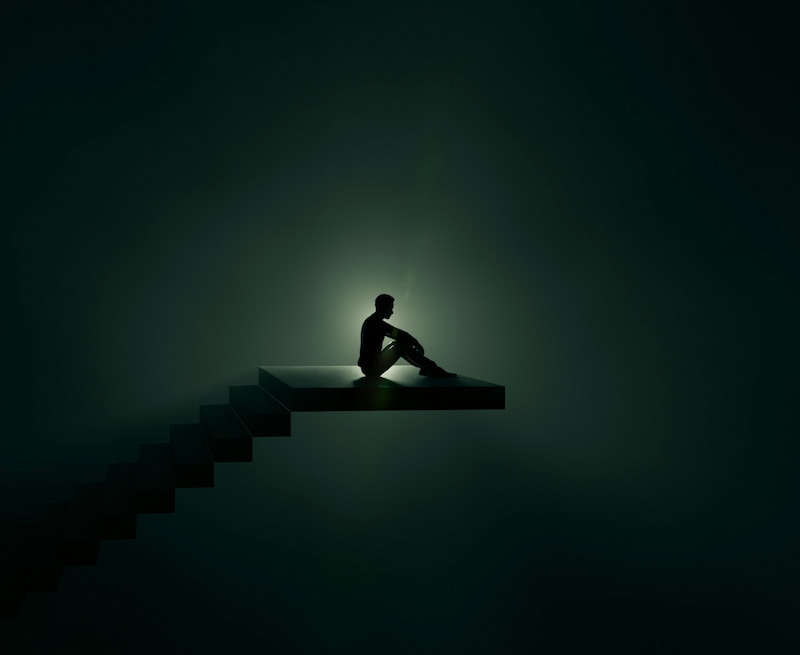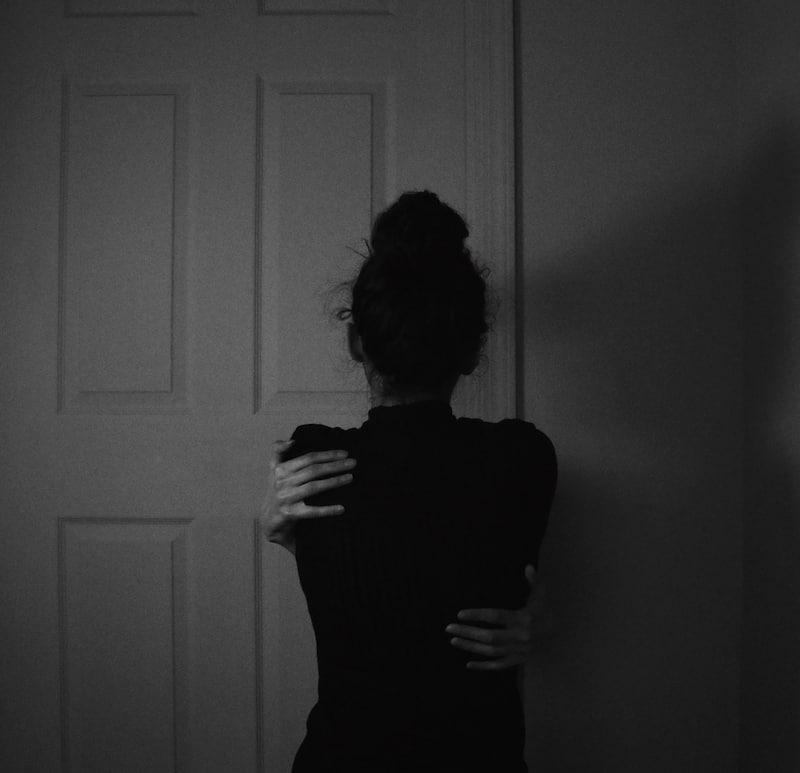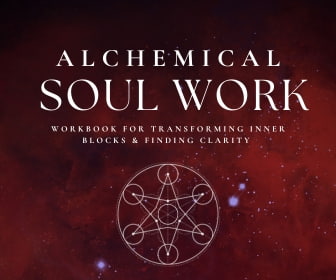Why do I refuse help from others? Why do I keep intentionally hurting myself? Why do I keep making the same mistakes over and over again?
How often have you asked yourself any of these questions?
Self-destructive behavior can be a daunting topic. It’s like a gremlin that lurks in the dark corners of existence, hiding in places we train ourselves to overlook and intentionally avoid.

Soul Work Compass Course:
Feeling lost or disconnected? The Soul Work Compass guides you through a 12-lesson alchemical journey to transform emptiness into clarity and deep self-insight. Create your personal compass to navigate life with clarity, freedom, and soul-aligned direction. Start your Great Work today!
But the more we put off facing our self-destructive behavior, the more it consumes us.
Are you ready to face the self-destructive parts of you? Remember that toxic behavior comes from only one part of you – it doesn’t define the whole of you.
(If you need more help after reading this article, I highly recommend checking out our Self-Love Journal and Shadow Work Journal to go deeper and help heal self-destructive tendencies.)
Table of contents
- What is Self-Destructive Behavior?
- Why Are We Self-Destructive? (+ My Experience)
- 17 Symptoms and Habits of Self-Destructive Behavior
- You’re Not Broken (You’re Just Human)
- Self-Destructive Behavior and the Journey of Self-Love
- How to Stop Being Self-Destructive (6 Pathways)
- Self-Destructive Tendencies Q&A
What is Self-Destructive Behavior?

Self-destructive behavior is any action carried out by an individual that causes them direct or indirect harm. This self-inflicted harm may be experienced on a physical, mental, or emotional level and creates immense suffering throughout their life. Examples of self-destructive behavior include workaholism, substance abuse, eating disorders, self-martyrdom, self-harm, and any behavior that negatively impacts a person’s life for which they aren’t actively trying to change or don’t feel worthy of overcoming.
Why Are We Self-Destructive? (+ My Experience)

I’m not the first, and I certainly won’t be the last person to admit that I’ve had self-destructive tendencies.
From pushing away the people I love and housing self-defeating mindsets to repeatedly self-harming in my teenage years, I’ve been down this dark alley more than once.
As I’ve grown, however, I’ve realized that self-destructive behaviors are an expression of the Shadow Self (aka, our ‘dark side’), which causes issues such as low self-esteem, low self-worth, and eventually self-loathing.
Want to get LonerWolf at the top of your Google search results?
While psychologists speculate that self-sabotaging behaviors could be coping mechanisms (i.e., to deal with stress, pressure, social demands, etc.), others consider self-destructive behavior as a way of maintaining comfort zones due to lack of confidence or feelings of unworthiness (e.g., staying at the familiar bottom of the social ladder).
17 Symptoms and Habits of Self-Destructive Behavior
Self-destructive behavior comes in many guises – some extreme, some more subtle.
Here are some of the most common symptoms and habits of self-destructive behavior:
1. Self-defeating mindsets
Self-defeating mindsets are typically unconscious forms of self-destructive behavior that result in self-fulfilling prophecies. Examples include harboring thoughts, usually on a subconscious level, such as, “I’m going to fail; I just know it,” “I’ll never get out alive,” “This will completely destroy me,” etc.
2. Failing to take action
Failing to take action may be passive, but it’s still self-destructive. When we know something is bad for us but fail to take any action or steps to remedy the issue, we are essentially setting ourselves up for (and guaranteeing) failure.
3. Over-eating
Over-eating usually appears as the habit of cramming ourselves full of sugary, fatty, and processed foods. This unhealthy habit can result in many long-term health issues (not to mention the short-term negative impacts on mood, sleep, creativity, etc.).
4. Under-eating
Many under-eaters fool themselves into thinking they’re benefiting themselves. The reality is that under-eating is usually a band-aid for serious self-image problems and other psychological issues.
5. Forced incompetence or over-committal
Forced incompetence means portraying yourself as unintelligent or incapable of successfully achieving something. This habit usually stems from a lack of confidence in your abilities and can function as a coping mechanism (e.g., to deal with academic pressure).
The opposite of forced incompetence is over-committal, where we commit to too many responsibilities, become “super capable,” and turn into workaholics, even though it burns us out and begins to feel soul-sucking very quickly.
6. Going out of your way to harm others
What goes around comes around, as they say, and the negative influence you have on others, whether by words or deeds, will eventually manifest in your own life (e.g., through sicknesses, tragedy, legal issues, isolation, etc.). On some level, we all know this truth, yet sometimes we go ahead and hurt others anyway.
Would you like to save this?
Your information will never be shared.
7. Physical self-harm
Physical self-harm is an extreme physical expression of self-destructive behavior. This practice is connected to low self-worth and the desire to cope with emotional pain in a physical way. Examples of physical self-harm include cutting, burning, and hitting oneself (or inciting others to do this to us, such as by intentionally provoking a fight). In extreme cases, physical self-harm can manifest as suicide attempts. (Please seek help from one of these hotlines if you do feel suicidal. There is always compassionate help available.)
8. Self-pity
Self-pity is an unconscious form of self-destructive behavior. It is destructive because it encourages us to remain inactive (i.e., wallowing in our misfortunes) rather than encouraging a proactive approach toward life.
9. Drug and alcohol abuse
Many people transform their anger into self-destructiveness—drinking their lives away or becoming oblivious in drugs or working too much. They make take it out on their children, employees, or animals. They may be passive-aggressive in a number of ways— being silent, uninvolved, offering insincere love and friendship, being available for people but making them suffer for it.
– Thomas Moore
A self-evident form of self-destructive behavior, drug and alcohol abuse creates endless misery in the lives of addicts and their friends and family members. Drug and alcohol abuse are usually connected to soul loss – or being disconnected from your soul.
10. Social self-alienation
While not always done consciously, social self-alienation is the act of deliberately isolating yourself from your peers. This could be through a variety of irritating, repelling, or antisocial behaviors that, on some level, you know are self-destructive.
11. Hiding from emotions
Failing to acknowledge negative (and sometimes positive) emotions creates a host of mental, emotional, and physiological illnesses. Hiding from emotions is another form of unconsciously manifested self-destructive behavior.
12. Refusing to be helped
Pushing away advice, refusing to go to rehab, avoiding the psychologist – all of these examples are signs of not wanting to be helped which is a reflection of the deep core belief that “I’m unworthy.” Refusing to be helped is a form of self-destructive behavior because it prevents growth and healing from occurring within you.
13. Unnecessary self-sacrifice
Some people are in love with their misery because that is all they have known for a large portion of their lives. Unnecessary self-sacrifice or being a martyr are good ways of making us feel “noble” and “altruistic” while masking the actual act of self-sabotage (which is giving up on the hopes, dreams, and passions that make us truly happy).
14. Spending too much
Whether through chronic gambling or constant Amazon purchases, overspending may seem unusual to include on this list, but it is nevertheless a form of self-destructive behavior that limits one’s freedom and peace of mind.
15. Physical neglect
Getting poor sleep, refusing to exercise, eating unhealthy food, and failing to maintain the general well-being of your body are all classic signs of common self-destructive behavior. Risky sexual behavior and poor personal boundaries are also a sign of physical neglect.
16. Mental neglect
Refusing, avoiding, or failing to confront your psychological health issues (e.g., stress, anxiety, depression, paranoia, OCD, etc.) delays the healing process, resulting in the perpetuation of long-term issues.
17. Sabotaging relationships
Sabotaging your relationships is a complex symptom as it involves many destructive behaviors such as jealousy, possessiveness, emotional manipulation, neediness, violence, and so forth. When we don’t feel worthy of love, we unconsciously manifest this in our relationships through the way we choose to behave.
You’re Not Broken (You’re Just Human)

If you identify with any or most of the above signs, you might feel your stomach sink, and a dark cloud of sadness or resentment may wash over you.
You might even start thinking that you’re fundamentally “broken” or that “something is severely wrong with you.”
But please understand that it’s normal to identify with many of the above signs. There’s nothing wrong with you. You’re not broken. You’re not a lost cause. You’re simply human. And that’s totally okay.
Why is it normal to possess many of the above self-destructive behavior signs? The answer is that most people have either been negatively programmed by their family or society or have unconsciously adopted these actions as a defense mechanism to protect against mental and emotional pain.
In other words, it’s not your fault and you aren’t to blame for your self-destructive behavior. But it IS your responsibility to work through it.
You didn’t choose to be self-destructive, did you? You didn’t think at some point, “Hmmm, I think I’m going to be self-destructive now,” did you? It’s just what happened.
The goal here isn’t to feel terrible about yourself. Instead, the goal is to see that “it is what it is” and find ways to reverse, undo, and overcome your self-destructive tendencies.
Self-Destructive Behavior and the Journey of Self-Love

The very fact that you’re here right now reading this guide is already a sign that you’re awakening out of the dream of self-destruction.
In other words, you’re starting to become more self-aware, and self-awareness is a sign that you’re spiritually awakening or at least you’re making self-care more of a priority in your life.
If you’ve been on a shadow work journey of working through your inner darkness, you may have come across some self-destructive behavior pattern within yourself, which is why you may find yourself here.
Going through the dark night of the soul is also another reason why you might find yourself exploring your self-destructive tendencies as you seek to find more meaning and deeper fulfillment in life.
Whatever the case, it’s helpful to understand that self-destruction is the opposite of self-love. And in many cases, our tendencies towards self-destructive behavior are totally unconscious and on autopilot because we were never taught how to love and value ourselves.
In the words of writer and speaker Alan Watts,
When you won’t love, or won’t let it out, it emerges anyway in the form of self-destruction. The alternative to self-love, in other words, is self-destruction. Because you won’t take the risk of loving yourself properly, you will be compelled instead to destroy yourself.
As such, we can see that learning how to love yourself is the antidote to self-destructive behavior.
How to Stop Being Self-Destructive (6 Pathways)
While I can’t give you a magical cure, I can give you some ideas, inspiration, and a few tried-and-tested paths to follow. Try all of these practices systematically or select a few and work with them consistently.
On average, it takes around 66 days to establish a new habit, according to what researchers have found. So make it your goal to stick with at least one of these activities for two months.
Here are the practices:
1. Grow your self-awareness by keeping a journal every day

Journaling has numerous mental health benefits, and it’s a powerful way of increasing your self-awareness. In fact, we could say that self-awareness is the most crucial ingredient in overcoming self-destructive tendencies! Read more about how to journal and the practice of self-awareness for more guidance. Our Self-Love Journal is a powerful place to begin if you want to get started right now.
2. Free yourself of compulsive, self-destructive behavior through meditation or mindfulness

There’s a reason why you keep hearing about these two practices, and it’s because they work! Even if you struggle to meditate traditionally, there are endless forms of mindfulness meditation out there that might spark your interest.
Examples of meditation/mindfulness activities include breathwork, walking meditation, mindful art therapy, chanting mantras, guided journeys, chakra visualization, etc.
If you don’t know where to start, I recommend downloading a meditation app such as InsightTimer, Calm, or Headspace. I started off with these apps, and they helped me tremendously. Bringing these key spiritual practices into your life can have profound benefits.
Try starting with 5-10 minutes in the morning or evening every day at the same time (to create a habit out of it).
Meditation and mindfulness are so effective because they help you to come back home to the present moment and create more inner space, which frees you from the compulsiveness and autopilot of self-destructive behavior.
3. Release your pent-up emotions by doing some emotional catharsis

Sometimes, the reason why we’re self-destructing is that a deeper emotion (such as anger, grief, or fear) isn’t being expressed.
Just think of a kettle: the more it boils, the more steam is released. But if that kettle had no way to release that steam, it would eventually explode! The same thing applies to you: you need a pressure valve, a way to channel your pent-up emotions.
When you don’t channel those buried emotions in a healthy way, they can come out in self-destructive behaviors.
So find something you enjoy doing that requires intense mental or physical effort. Examples include boxing, running, singing, dancing, creating art, or plain old screaming and crying (doing this privately is a good idea if you’re living with people!). One unconventional form of catharsis is called dynamic meditation.
4. Learn self-care and self-love through some simple habits

Self-love is a basic attitude of kindness toward yourself: it is the practice of taking care of your mental and emotional needs.
Self-care, on the other hand, is generally more oriented toward your body: it involves eating properly, getting enough sleep, drinking adequate water, wearing comfortable clothing, staying healthy, etc.
Both self-love and self-care go beautifully hand-in-hand as allies against self-destruction.
I understand that self-love may feel like a bit of a stretch for you, so if you want a place to start, begin with self-care.
Begin with even just one self-care practice each day and make it into a habit by doing it at the same time and same place.
For example, you could decide to take a morning walk at 7:30 am each day to help your body feel energized and relaxed. Or you could drink a cup of chamomile tea at the end of your day as a winding down self-care ritual.
You can find more ideas in my self-care ideas article. And if you’d like to practice self-love, I recommend my how to love yourself post, as well as our guided self-love journal.
5. Explore your core beliefs which are at the root of self-destructive behavior

Core beliefs are at the very root of self-destructive behavior because that which we think we often become. Whatever internal dialogue that runs around in our mind is often what dictates our behavior. After all, isn’t it true that we often act on what we believe to be true?

Feeling Lost?
The Alchemical Soul Work Workbook provides you with a clear path to clarity through the seven ancient stages of alchemy. With 50+ journaling prompts, you'll dissolve old patterns and forge a stronger connection with your Soul.
For example, if you carry the core belief that “no one will ever love me,” you will unconsciously and perhaps sometimes intentionally behave in ways that alienate other people so that they don’t hurt you, therefore reinforcing your belief that “no one will ever love me” because you don’t give others the chance to even try!
Core beliefs can be tricky because they’re usually unconscious and automatic, and yet, once we shine the light of our awareness onto them, we can see through them, change them, and find more freedom and peace.
Examples of core beliefs that can result in self-destructive behavior include:
- I am bad
- I am unlovable
- I am unworthy
- I always hurt people
- I am stupid
- I am weak
- I don’t deserve happiness
Core beliefs often start with the words “I am …” and they can be discovered through reflection, inquiry, and journaling. You can find out how to pinpoint yours in my core beliefs guide.
6. Sometimes, there’s a limit to what you can do, and you’ll need to find a coach, counselor, or therapist

If you have strong self-loathing or intense self-destructive tendencies, you might not even have the impulse to take on board any of the advice in this article (*ding ding!* that’s another form of self-destruction, but it’s okay, you’re only doing what you’ve been unconsciously programmed to do).
As such, my best advice is to find a coach, counselor, or therapist ASAP. Sometimes the best thing is to see our true worth in the mirror of another. Sometimes we need someone to hold our hands and actively guide us in a 1-to-1 way.
If this is the case, your search engine is your best friend. Look up the keywords “self-destructive behavior counselor near me,” and you’re bound to find someone who can help. If you’re fine with online sessions via places like Zoom, just use a keyword like “help for self-destructive behavior therapy” or look up “therapy near me.”
There’s only so much an article on the internet can do to help you. While you’ve taken a wonderful step towards health and healing, seeking out guidance in the form of a therapist or counselor will aid you with ongoing support and tools. These, in turn, will transform your life little by little. And soon, you’ll be able to look back on this behavior with a gentle smile and a sigh of relief, proud of your ability to overcome and heal.
Self-Destructive Tendencies Q&A

There are many reasons why someone might be self-destructive. On an emotional and psychological level, self-destructive tendencies may arise from childhood trauma, negative social conditioning, and low self-esteem that are due to having unsupportive or abusive parents, family members, or peers. On a spiritual level, self-destructive tendencies are due to soul loss or the disconnection from your true and authentic essence.
Examples of self-destructive behaviors include excessive self-sacrifice, over-eating or under-eating, sabotaging close relationships, smoking or drinking too much, drug abuse, and self-harm.
The first step to overcoming self-destructive tendencies is to simply be self-aware of what’s happening. Journaling about your discoveries is a powerful place to begin. The next step is to practice self-care and self-love. Learning how to take care of your body and nurturing yourself on a mental and emotional level are crucial steps to overcoming self-destructive behavior.
Self-destructive thoughts are a product of low self-esteem and a part of us known as the inner critic. It’s crucial to remember that this is just one part of you, not the whole of you. You’re so much bigger than the self-destructive thoughts that randomly pop into your mind. Remember that we all get self-destructive thoughts from time to time (and you don’t need to believe them in the first place!), but you might just be more sensitive to believe them due to past trauma.
***
Self-destructive behaviors can be both conscious and unconscious – and they can end up sabotaging our health, happiness, and long-term well-being. But please remember that these harmful tendencies are a symptom of a deeper wound that needs to be shown compassion.
It’s important to remember that you’re not alone. Like me, you can probably identify with a couple or more symptoms of self-destructive behavior on this list. But when you take the first step on your healing journey of developing more self-awareness, self-care, self-forgiveness, and self-love, you will eventually be free of your self-destructive tendencies.
Don’t forget that if you need more help from now on with your self-destructive tendencies, our Self-Love Journal can help you with just that.
What are your experiences with self-destructive behavior? How did you learn to overcome them? I’d love to hear your stories below! Let’s help others not feel so alone.
Whenever you feel the call, there are 2 ways I can help you:
1. The Soul Work Compass Course: Ready for deep transformation without the fluff? The Soul Work Compass provides a step-by-step path to finding your inner truth and life direction. Heal core wounds, clarify your values, and walk away with a concrete guide for living. Get started now!
2. The Inner Work Journal Bundle: Stop surface-level healing. Dive into the depths with 150+ journaling prompts designed to help you face your demons, heal childhood wounds, and embrace your shadow. Three sacred journals, lifetime access, print as many times as you need. Real transformation starts here.


 $3
$3

I think im self-destructive i cant seem to feel emotions i mean im sure they are there but i guess they’ve been repressed for so long that they hust stay. However there have been moments where i feel like i should feel something and it in my gut but then its gone and im back to my normal self. What do u think i should do?
You are right Katherine, emotional repression causes this kind of issue. For the benefit of your long-term health, I really recommend researching different forms of catharsis. You could start here: https://lonerwolf.com/emotionally-repressed/
After doing something really shameful (not for the first time) and after an aweful semester at school, I came to the conclusion that I am very self-destructive. Thus, this was a very enlightening read; it’s helped me to confirm this while also providing me awareness of my bad habits. But, how do I stop? I’ve tried to seek help but I’ve found that either the dr. Isn’t very helpful, or otherwise I’m too busy (from college and working). Do you mind if I ask your advice?
It’s my pleasure to help William. :)
Generally, when we WANT to stop bad habits, it is important for us to develop self-awareness. Self-awareness helps us to identify where, when and why we do what we do. There is more on how to develop self-awareness in this article: https://lonerwolf.com/involution-self-awareness/
Otherwise, sometimes there is an unconscious part of us that DOESN’T want to stop our bad habits. This is generally because they are so habituated, and built into us, that they provide a level of comfort. If we are used to thinking negatively and assuming the worst in everyone, for instance, it can be hard to stop this habit as it becomes comfortable. It is easy to close ourselves off, but harder to open ourselves up. Sol describes this as “falling in love with your misery”, which he wrote about here: https://lonerwolf.com/misery-makes-you-happy/
I hope these pointers help!
really interesting read… what ive noticed is that I tend to go through cycles of self destruction. it started when I was about 14-15. I TRIED to develop an eating disorder. I wanted one. I wanted to be fucked up- not realising that in trying to develop an eating disorder I was actually developing one… just not the one I wanted. apologies if this offends anyone… its incredibly ignorant- but I was young and very unhappy and wanted a label for my unhappiness. I wanted to understand what it was. I wanted it to have a shape.
then when I was 18 I went to uni and just imploded… started taking drugs and drinking lots and spiralled down to rock bottom. fell in with the heavily and chaotically addicted people and started living like them…drug dealers.. shoplifters…. I lived in a world of the non stop partiers.. drugs all day every day. and then I moved from stimulants to smoking weed…
I met my ex. I was homeless, id fucked up uni, lost my family and friends and self respect. id lost reality. I met him, and he picked me up for a while. and then tumbled me into an even deeper hole…
for the 14 months I was with him I reached a new level of hell. physical, emotional and psychological abuse. severe. fever pitch. self harm…obsession… the worst time of my life. I cannot really begin to describe how awful it was. and the scars it left. the scars I still feel. 4 years on.
after I ended it with him I started a new cycle. the cycle of trying to hide the pain, forget the pain, forget him. drinking. lots and lots of drinking. and I fell in with an even worse crowd..his friends. he went to prison but I carried on with his friends. if you can call them that. these people..evil people. drug dealers, arms dealers, violently misogynistic, totally morally deficient. I slept around, totally unprotected. didn’t care. just wanted to forget. drinking, smoking, drugs. I lived it. if you can call that a life. being degraded, abused, used, destroying yourself bit by bit. drink after drink.
I started to pick myself up a bit after that cycle… went back to college- still a massive stoner. but not as bad with the drugs, the sessioning (taking drugs and staying up for days and nights partying). got a new boyfriend. was ok for a while.
then my ex got out of prison, and then there was a year of seeing him on and off, reckless behaviour…. and so on.
then I got raped. on a park. broad daylight. and my ex (the abusive one), looked after me for a month. when I say looked after I mean held captive for a month. under his thumb. dependant. and the sessioning started again. but only for a month. a shorter cycle this time. although saying this ive been raped twice before this incident. during the drinking period. just didn’t call it rape because they were people I knew… I didn’t know it was rape. I just felt numb. it felt normal.
that was july 2014 (the day on the park and the wrecky month). its now December 2014. Im at university again. totally different part of the country. I don’t take drugs. I only smoke weed every couple of weeks. I drink a lot less. I even did a sober month recently. :) things are looking up. im trying to be a social worker. im happier… still struggling to move on from the abuse. the pain. the lifestyle that I lived. I often feel stuck in the past, ruminating on what ive been through. the things ive seen. the things ive done. the people ive known… the horrors of it all. but im trying.
but part of me is just waiting for the next cycle… when will it be? what will I do? what will I destroy. what will I lose. will I go that low again? I hope I don’t…
this is a bit of a random post. more for myself than anyone else. I don’t expect a reply. I just needed to let this out.
by the way…im 23 now. 5 years of my life… destructive. I guess I encompass all of the above types of self destruction haha!
I’m glad you got all of this out Yasmin. Expressing what you hold inside is cathartic and a healthy way to assess and learn from your experiences in the past, to better yourself in the future. The good thing is that you are acknowledging all of your mistakes and faults, and are not hiding from them. This is a courageous act, one that can better help you grow and strengthen. Have you read into self-love? This is something I really really recommend you look into if you haven’t already, and try to cultivate. Your life will be better for it! Here is a link if you are interested: https://lonerwolf.com/low-self-esteem/
wow! so.. I just realize I have 8 of this characteristics, …. it’s almost the same, (just like my A.D.D I have 4 of 5 characteristics to be a full person to have A.D.D.).. that explains a lot of what happens in my mind.
Now that you acknowledge that you are a self-destructive person Yashiki, you can take the best steps to confront this, and change your behavior. Developing self-awareness, for example, is essential if you are to catch yourself in the process. This can be done through mindfulness meditation each day, solitude and introspection.
I just want to say how deeply grateful and old girl like me is that there are young, beautiful people like you and Sol have been brought into my life, as I finally try to understand so much of what has made 54 years here simply not so easy! I have always known that I am an old soul, however, always felt utterly alone. Now, there are people like you, and many others that I am finding, who resonate perfectly with the journey I am on.
May yours be infinitely blessed.
Janine, thank you for your beautiful comment. It makes me happy to know that the work of Sol and I can reach any person of any age and still speak to them. I appreciate your words that have shown this!
Warmly,
-Luna
6, 9, 11, 12, 13 are slowly but surely destroying my life! I just discovered this site recently, some great articles on here, hopefully they will help.
I’m really glad that you found this article Jay, as self-destructive habits are some of the worst in life. You will make change in your life if you continue with persistence and will power developing self-awareness and self-acceptance.
-Luna
You’re obsessed with bodily functions: you need to see a psychiatrist. Do you edit and read
what you’ve written?…. 6 Signs People Don’t Give a Stuff What You Say…Every analogy is poop related….
Haha, what can I say Rebecca? :) You must have some lightness in life, even if in the form of childishness (which some people find endearing, others find irritating!) Poop is really quite a fascinating thing. :P
Live lightly,
-Luna
Great article, very helpful! For me the most destructive thing I tend to do is to slip out of good habits at the first sign of stress/unexpected occurrences. Positive things like regular exercise, eating well, journalling, meditation etc (the stuff that is vital for my wellbeing) are the first things to disappear if there is a lot to do or I feel stressed. This is destructive because at those times these are the very things that will help me THROUGH the stress! Well, I guess self-awareness is the first step towards change, so that’s good! :)
Thanks again.
Thank you Andy.
I second you there: when the going gets tough, the tough gets going – that sort of summarizes many of my choices in the past, so I can understand where you are coming from!
Thanks again for reading,
-Luna
First of all, thanks for penning this article. I hope that it gets people who are feeling stuck in self destructive ways to see they can reclaim their lives and make begin changes for the better.
I don’t know if people are so much “in love with their misery” but are unaware that there are much healthier alternatives. I’ve lived much of my life with the inflexible mindset that I’m a prisoner to my thoughts and behaviors and that’s just the way it is. It really all starts with self awareness, slowing down the mind and becoming a witness to your own self imposed suffering. I have found DBT–Dialectical Behavioral Therapy–immensely helpful in taming the self destructive beast. But you must be committed and be prepared to work your ass off because most of us even though we say we want to change find ourselves reverting to old behaviors once we start feeling uncomfortable charting new territory. True change comes gradually and requires risk, patience, self-acceptance, and a whole lot of humility. And a sense of humor helps as well. There is a saying in DBT I find helpful: I’m doing the best I can AND I can do better.
Hey Brad, thank you for your thoughts.
DBT sounds interesting (I haven’t yet researched it). And you’re right – anything good for you is not necessarily easy. In fact, in my own experience the path of Involution is a long, tiring and difficult one, but ultimately, as I have found, an immensely rewarding and fulfilling one.
The expression “being in love with ones misery” does not necessarily refer to consciously being in love with sadness and melancholy. Generally people unconsciously cling to their misery, either because it provides comfort and convenience (they don’t have to change anything), or is safe and familiar (it is the only thing they have know for many years). I hope this makes sense.
Many thanks for reading. :)
-Luna
hi i read your article with intrest can identify with so many of those traits .For 30 years i abused alchol and for those thirty years i hated myself every day ,self pity was a big one low self esteem , suicidal thoughts , hiding from emotions self harm actually i can relate to all of the above. 4 years ago i asked for and got help and my life started,its been a difficult but v worth while ongoing journey to freedom . im now lovin life and me (mostly) hav a strong belief in a higher power and lots of gratitude , ;) enjoying yere blog dec
Declan, that is really encouraging to hear, and I’m so happy that you have invested such a great amount of effort into yourself, and bettering your life. Such decisions show self-love and self-respect.
I’m happy that this article could show you how far you have come, in a way.
All the very best with your progress,
-Luna